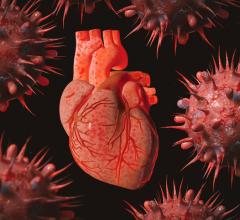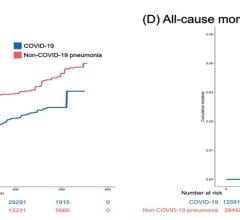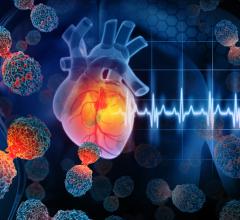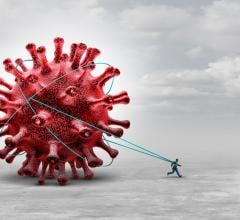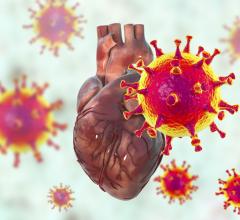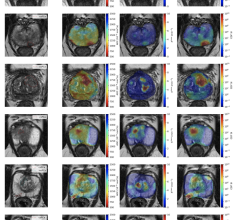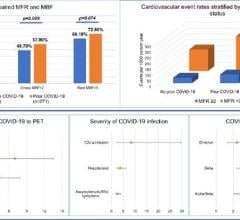
A Johns Hopkins Medicine study of nearly 4,500 patients hospitalized with COVID-19 suggests that statins — medications widely used to control cholesterol — are not helpful in reducing COVID-related mortality or the severity of the illness. Graphic created by M.E. Newman, Johns Hopkins Medicine
November 5, 2021 — In the worldwide effort to battle COVID-19 (SARS-CoV-2), researchers have often turned to medications used as therapies for other conditions in the hopes of finding ones that either kill the coronavirus or lessen the impacts from its infection. Recent small-sample studies (fewer than 200 patients) have suggested that statins, cholesterol-lowering drugs that lower levels of low-density lipoprotein (LDL), also may reduce the chances of severe disease or death from COVID-19.
However, the findings from a recent Johns Hopkins Medicine-led study of nearly 4,500 patients hospitalized with COVID-19 over a four-month period provide a stronger case for a very different conclusion: Statins likely do not confer any impact — positive or negative — on COVID-related mortality and may be associated with a significantly increased risk — nearly 1 chance in 5 — of more serious illness.
The study was published Sept. 10, 2021, in the journal PLOS ONE.[1]
“Despite the apparent beneficial effect of statins on the outcomes of various infectious diseases, our study revealed that their specific use to treat COVID-19 is probably not merited,” says senior study author Petros Karakousis, M.D., professor of medicine at the Johns Hopkins University School of Medicine. “Compared with earlier research, we looked at a larger and more widely varied inpatient population, and had better criteria for defining disease severity, thereby enabling our results to be more relevant for predicting the impact of statins on COVID-19 outcomes in hospitalized patients.”
In the study, Karakousis and colleagues reviewed the records of 4,447 patients, ages 18 years or older, hospitalized at five medical facilities in the Johns Hopkins Health System who had been diagnosed with SARS-CoV-2 infection between March 1 and June 30, 2020. Of these, 594 (13%) were receiving statins at admission. Statin users were mostly men (57%) and older (ages 52–78 compared with ages 29–62) than the non-statin users. The largest percentage of statin users were Black (47%), had hypertension (74%) or diabetes (53%), and were more likely to take medications for lowering blood pressure — along with statins to reduce their LDL cholesterol.
To be counted toward COVID-19-related mortality, death had to occur as a result of the disease during the hospital stay. The researchers defined a case of severe COVID-19 as one in which a patient had a prolonged hospital stay of seven days or more, or required invasive medical ventilation to breathe.
After accounting for other known factors that might skew the data, the researchers found statin use had no significant effect on mortality from COVID-19. However, they did find that patients hospitalized with COVID-19 and taking statins had an 18% increased risk for having a more severe form of the disease than patients who did not take cholesterol-lowering agents.
“One plausible explanation for this finding is that statins increase cellular production of angiotensin-converting enzyme 2 [ACE2], the receptor on a cell’s surface through which SARS-CoV-2 gains entry,” says Karakousis. “Therefore, statins may lower a cell’s resistance to infection and in turn, increase the odds that the patient will have a more severe case of COVID-19.”
Karakousis says future studies should attempt to better define the relationship between statin use and COVID-19.
“All of the studies published to date, including ours, have been retrospective — and that means no matter how hard one tries to eliminate factors associated with poor COVID-19 outcomes other than statin use, some may still be at work,” says Karakousis. “For example, there’s the fact that many statin users also are overweight, have diabetes or experience high blood pressure — all things that can impact the severity of COVID-19 on their own.”
Karakousis says the only way to definitely determine if statins have any benefit for patients with COVID-19 is to conduct a clinical trial in which randomized groups of patients receive either statins or a placebo in addition to standard therapy.
Along with Karakousis, the members of the study team at Johns Hopkins Medicine are Samuel Ayeh (lead author), Enoch Abbey, Banda Khalifa, Richard Nudotor, Vignesh Chidambaram, Ngozi Osuji, Samiha Khan, Modupe Oduwole, Hasiya Yusuf and Esosa Nosakhare. Also listed as study authors are Albert Danso Osei at Medstar Union Memorial Hospital in Baltimore, Emmanuella Salia at the University of Tennessee Health Science Center in Memphis, Tennessee, and Oluwatobi Lasisi at the Wayne State University School of Medicine in Detroit.
This study was supported by National Institute of Allergy and Infectious Diseases/National Institutes of Health grants UH3AI122309 and K24AI43447.
None of the authors have any financial disclosures or conflicts of interest to disclose.
Related Statin and Cardiac Drug COVID Content:
Large Study Confirms Statins Reduce COVID-19 Severity
Statins May Reduce COVID-19 Severity
ESC Council on Hypertension Says ACE-I and ARBs Do Not Increase COVID-19 Mortality
First Randomized Trial Backs Safety of ACE and ARB Heart Drugs in COVID-19 Patients
No Evidence Supporting Discontinuing RAAS Inhibitors in COVID-19 Patients
Reference:

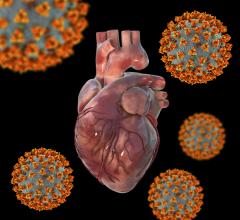
 March 20, 2024
March 20, 2024 
